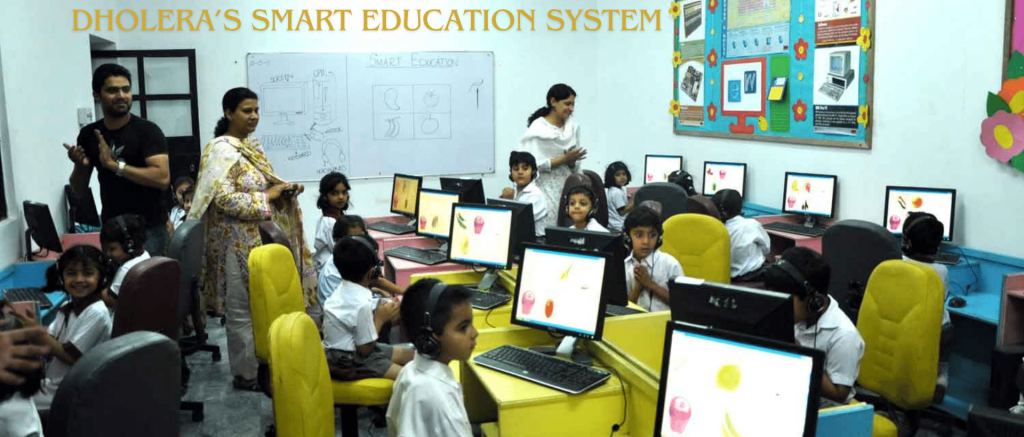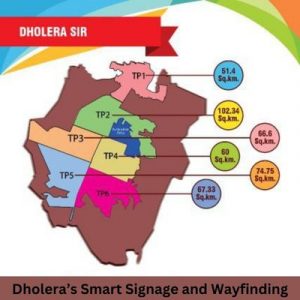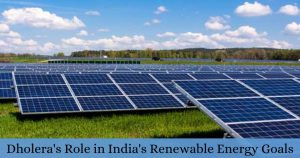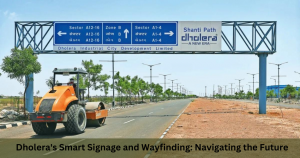In recent years, India has witnessed a paradigm shift in urban development, with smart cities leading the charge towards a digitally enhanced, sustainable future. The Dholera Special Investment Region (DSIR) stands out as a beacon of innovation among these emerging urban centers. Located in Gujarat, Dholera is India’s first greenfield smart city project to showcase how technology can be harnessed to create more efficient, livable urban spaces. One of the cornerstone initiatives of Dholera’s development is its Smart Education System, a comprehensive approach to redefining how education is delivered and experienced.
The Vision for Dholera’s Smart Education System
At the heart of Dholera’s vision for smart education is the belief that learning should be accessible, personalized, and lifelong. Three core principles drive this vision:
- Inclusivity and Accessibility: Ensuring that high-quality education is available to all, regardless of socio-economic status.
- Integration of Technology: Leveraging cutting-edge technology to enhance the learning experience and administrative efficiency.
- Sustainability: Promoting practices that support long-term environmental, economic, and social well-being.
The Infrastructure Backbone
A robust infrastructure is critical for the success of any smart education system. In Dholera, this begins with state-of-the-art school buildings designed to provide a conducive learning environment. These facilities are equipped with:
- Smart Classrooms: Classrooms fitted with interactive whiteboards, high-speed internet, and digital projectors to facilitate engaging lessons.
- STEM Labs: Dedicated spaces for science, technology, engineering, and mathematics (STEM) education, featuring the latest tools and resources for hands-on learning.
- Libraries and Media Centers: Digital libraries offer vast repositories of e-books, research papers, and multimedia content accessible to students and teachers alike.
- Sports and Recreational Facilities: Modern amenities to promote physical fitness and overall well-being.
Integration of Technology in Learning
Dholera’s smart education system is a model of how technology can be seamlessly integrated into learning processes. Key elements include:
1. Digital Learning Platforms
The backbone of Dholera’s educational technology strategy is its digital learning platforms. These platforms provide a comprehensive suite of tools for both students and educators, including:
- E-Learning Modules: Interactive and multimedia-rich lessons that cover the entire curriculum, allowing students to learn at their own pace.
- Assessment Tools: Online quizzes, tests, and assignments that provide instant feedback and track student progress over time.
- Virtual Classrooms: Platforms for live, interactive classes where students can engage with teachers and peers in real time, even from remote locations.
2. Artificial Intelligence and Data Analytics
Artificial Intelligence (AI) and data analytics play a pivotal role in personalizing the learning experience. By analyzing data from student interactions with digital platforms, AI algorithms can:
- Personalize Learning Paths: Tailor educational content to meet the individual needs and learning styles of each student.
- Predict Outcomes: Identify students who may need additional support and provide targeted interventions to help them succeed.
- Optimize Resources: Help educators understand which teaching methods and resources are most effective, enabling continuous improvement.
3. Internet of Things (IoT)
The Internet of Things (IoT) connects various devices and systems within the educational infrastructure, enabling smarter, more efficient management. In Dholera’s schools, IoT applications include:
- Smart Attendance Systems: Automated attendance tracking using biometric or RFID technology, reducing administrative burden and increasing accuracy.
- Environmental Monitoring: Sensors that track air quality, temperature, and lighting conditions, ensuring a comfortable and healthy learning environment.
- Resource Management: Systems that monitor and optimize the use of energy, water, and other resources, contributing to the city’s sustainability goals.
Empowering Educators
A smart education system is only as good as its educators. Dholera places a strong emphasis on empowering teachers through professional development and support. Key initiatives include:
1. Continuous Professional Development (CPD)
Teachers in Dholera benefit from ongoing professional development programs designed to keep them abreast of the latest educational technologies and pedagogical strategies. These programs include:
- Workshops and Seminars: Regular training sessions on new tools, techniques, and best practices.
- Online Courses: Flexible, self-paced courses that allow teachers to enhance their skills at their convenience.
- Peer Learning Networks: Communities of practice where educators can share insights, challenges, and solutions.
2. Supportive Technology
Educators are provided with a range of technological tools to support their teaching, including:
- Lesson Planning Software: Tools that help teachers design engaging, effective lesson plans quickly and easily.
- Classroom Management Apps: Applications that streamline administrative tasks, freeing up more time for teaching.
- Student Performance Dashboards: Real-time data on student performance, enabling teachers to provide timely and targeted support.
Engaging the Community
Education in Dholera extends beyond the classroom, with a strong emphasis on community engagement and lifelong learning. Initiatives to foster community involvement include:
1. Parent and Guardian Involvement
Parents and guardians are recognized as vital partners in the education process. Dholera’s smart education system includes features that facilitate their involvement, such as:
- Parent Portals: Online platforms where parents can track their child’s progress, communicate with teachers, and access educational resources.
- Workshops and Seminars: Regular events to educate parents on how they can support their child’s learning at home.
2. Lifelong Learning Programs
Recognizing that education is a lifelong journey, Dholera offers a variety of programs for adults and seniors, including:
- Skill Development Courses: Training programs in areas such as digital literacy, entrepreneurship, and vocational skills.
- Community Learning Centers: Spaces where residents can access educational resources, attend workshops, and engage in lifelong learning activities.
Promoting Sustainability Through Education
Sustainability is a core value in Dholera’s development, and this extends to its education system. Schools in Dholera incorporate sustainability into their curriculum and operations in various ways:
1. Green Curriculum
Students are taught about environmental stewardship and sustainability through:
- Environmental Science Classes: Courses that cover topics such as climate change, renewable energy, and conservation.
- Project-Based Learning: Hands-on projects that encourage students to develop and implement solutions to real-world environmental challenges.
2. Sustainable Practices
Schools themselves model sustainable practices, including:
- Energy-Efficient Buildings: Use of solar panels, energy-efficient lighting, and other technologies to reduce energy consumption.
- Waste Reduction Programs: Initiatives to minimize waste through recycling, composting, and responsible consumption.
- Water Conservation: Systems to capture and reuse rainwater, along with educational programs on water conservation.
Challenges and Solutions
Implementing a smart education system on the scale of Dholera is not without its challenges. Key issues and their solutions include:
1. Digital Divide
Ensuring that all students have access to the necessary technology is a critical challenge. Solutions include:
- Affordable Devices: Partnering with technology companies to provide affordable or subsidized devices for students.
- Public Access Points: Establishing community centers with internet access and digital learning resources.
2. Teacher Training
Equipping teachers with the skills to effectively use new technologies can be challenging. Solutions include:
- Comprehensive Training Programs: Extensive training and support for teachers to help them integrate technology into their teaching.
- Mentorship Programs: Pairing less experienced teachers with tech-savvy mentors who can provide guidance and support.
3. Infrastructure and Maintenance
Maintaining the technological infrastructure requires significant investment and expertise. Solutions include:
- Public-Private Partnerships: Collaborating with private companies to fund and manage infrastructure projects.
- Local Capacity Building: Training local technicians and engineers to maintain and support the technology.
Looking Ahead: The Future of Education in Dholera
Dholera’s smart education system is a work in progress, constantly evolving to meet the needs of its students and community. Future plans include:
1. Expansion of Digital Learning
Continued expansion and enhancement of digital learning platforms, incorporating the latest advancements in AI and machine learning.
2. Enhanced Community Engagement
Greater efforts to engage the wider community, including more programs for adults and increased collaboration with local businesses and organizations.
3. Global Collaboration
Building partnerships with educational institutions and organizations around the world to share knowledge, resources, and best practices.
Conclusion
Dholera’s Smart Education System is a bold and innovative approach to education, leveraging technology to create an inclusive, personalized, and sustainable learning environment. By prioritizing accessibility, technological integration, and community engagement, Dholera is setting a new standard for educational excellence in India and beyond. As the city continues to grow and evolve, its commitment to education will undoubtedly play a crucial role in shaping the future of its residents and the broader society.




